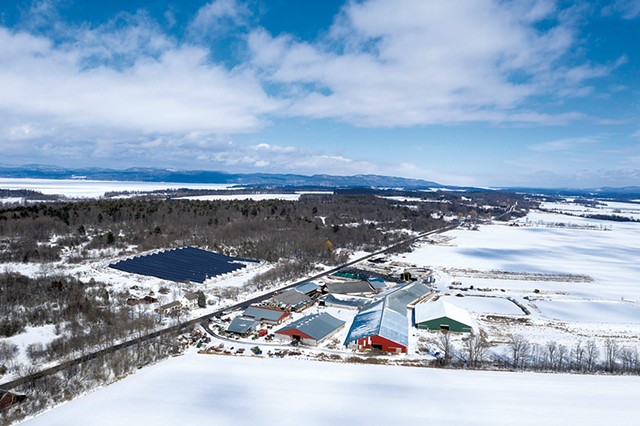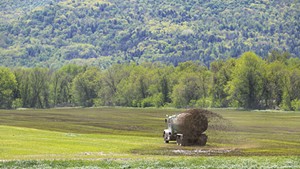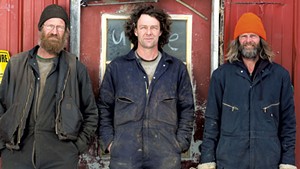Last week, a pair of Panton landowners sought to prove in a closely-watched civil trial in Addison County Superior Court that
Vorsteveld Farm, a large dairy operation that farms roughly 2,400 acres and milks 1,400 cows, is polluting their property and Lake Champlain.
The plaintiffs, Dennis and Vicki Hopper, whose primary residence is in Houston, Texas, spend five months a year at their lakefront home on Arnold Bay Road, downhill from the cornfields where brothers Hans, Gerard and Rudy Vorsteveld grow some of the feed for their herd. The Hoppers allege that the Vorstevelds' crop and manure management practices have increased the flow of runoff onto their land and rendered their shoreline, on Arnold Bay in Lake Champlain, unsuitable for recreation.
In 2017, the Vorstevelds installed a tile drainage system in the cornfields. The network of corrugated pipes, buried several feet below the surface, collects water from the soil and conveys it to two culverts on Arnold Bay Road, across from the Hopper property. The water flows beneath the road and into streams on the Hoppers’ land before emptying into Arnold Bay.
The Hoppers, represented by Rob Woolmington and Merrill Bent of the Manchester firm Woolmington, Campbell, Bent & Stasny, allege that since the Vorstevelds installed the tile drainage system and removed trees and shrubbery along the perimeter of the fields, the volume of water flowing through their property has increased substantially, eroding their stream beds and contaminating their pond. According to the Hoppers’ complaint, tests of their pond water indicated “high concentrations of nitrate, phosphorus, total suspended solids and other pollutants,” along with elevated levels of e-coli.
As a result of the increased volume of sediment-filled runoff, the Hoppers claim, cyanobacteria blooms have become more frequent in Arnold Bay, and algae has proliferated along their shoreline. The Hoppers also contend that the intensity of the flow has impeded the farming activities of their daughter, Annie, who leases a portion of their 140-acre parcel for the sheep farm she runs with her husband, Sean Willerford.
The Hoppers, who have previously filed complaints against the Vorstevelds with the Agency of National Resources, seek a court order to compel the Vorstevelds to restore water flows to pre-2017 levels.
The Vorstevelds have denied allegations that their farming practices have damaged the Hopper property. The Vorstevelds’ attorney, Jim Foley of the Middlebury firm Lynch & Foley, said in an interview that he believes the Hoppers are asking the court to supersede the authority of the state agencies charged with regulating farms, which would open, as he put it, “a Pandora’s box.”
“You open that box, and you can start expecting well-to-do people living next door to farms in Vermont to start filing suit with rapid fire to shut them down and curtail their activities,” Foley said.
Rob Woolmington, the Hoppers’ attorney, rejects what he called “the public relations narrative” that the case represents a referendum on dairy farming in Vermont. “Nobody is attacking the Vorstevelds’ right to farm,” he told
Seven Days. “The issue is, what are they going to do to stop the pollution that they're causing to Lake Champlain and to neighboring property?”
John Roberts, executive director of the Champlain Valley Farmer Coalition, of which the Vorstevelds are members, said that dairy farmers fear that a judgment against the farm could deal a decisive blow to an already precarious way of life. The economic pressures of the commodity market, he said, favor big farms over small ones.
“It is possibly a shock to somebody who thinks of agriculture as the farmer with a stalk of straw in his mouth, leaning on his gate and muttering about the weather," Roberts said. "Now, these farms have become 24 hour-a-day operations, because that's what the economy has driven them to, what food policy has driven them to. They’re doing what they have to do in order to survive.”
The trial, presided over by Judge Mary Teachout, was originally expected to last three days, concluding on Friday. It is now slated to resume in early January.
Read the complaint here:















Comments
Comments are closed.
From 2014-2020, Seven Days allowed readers to comment on all stories posted on our website. While we've appreciated the suggestions and insights, right now Seven Days is prioritizing our core mission — producing high-quality, responsible local journalism — over moderating online debates between readers.
To criticize, correct or praise our reporting, please send us a letter to the editor or send us a tip. We’ll check it out and report the results.
Online comments may return when we have better tech tools for managing them. Thanks for reading.